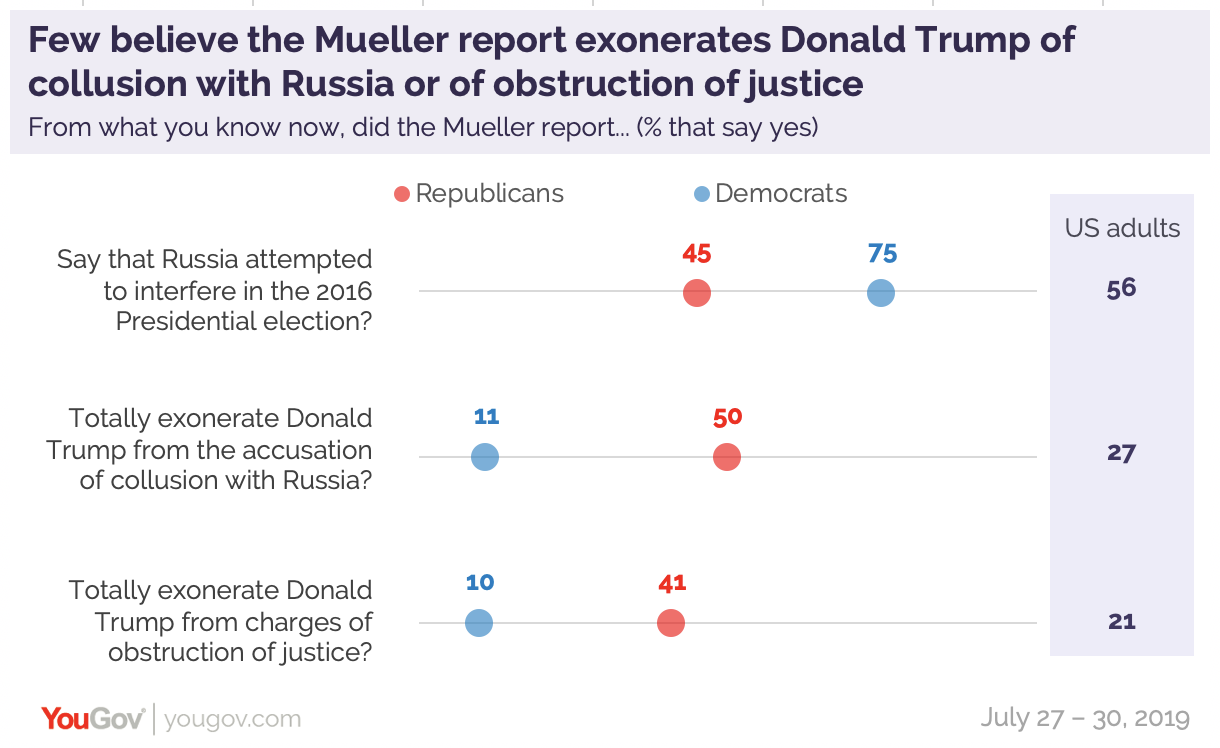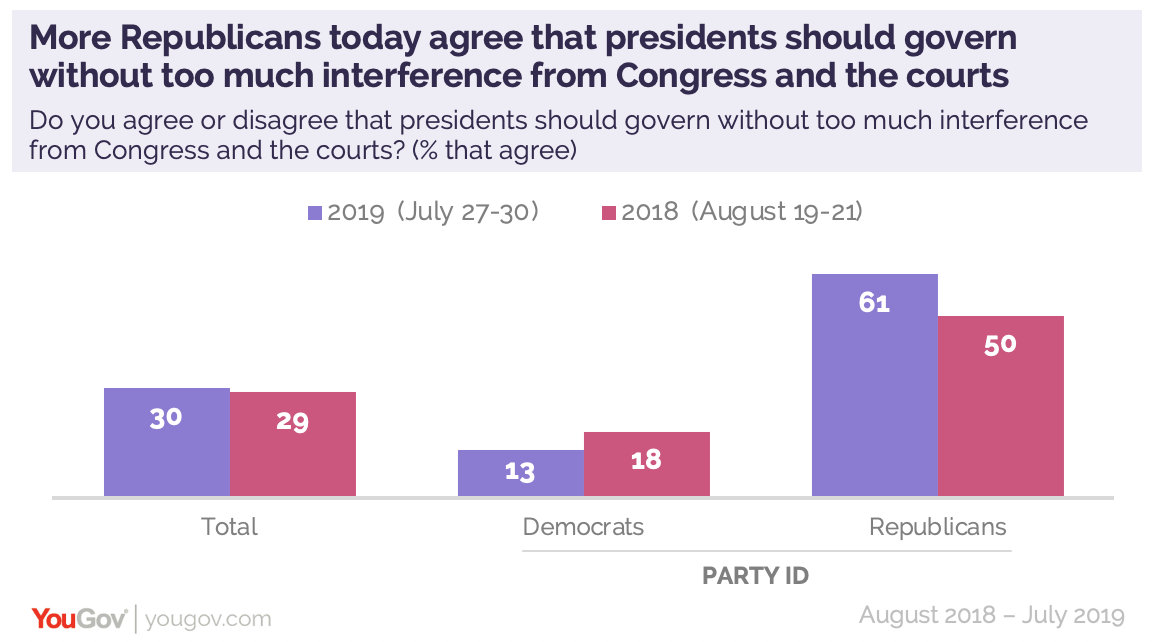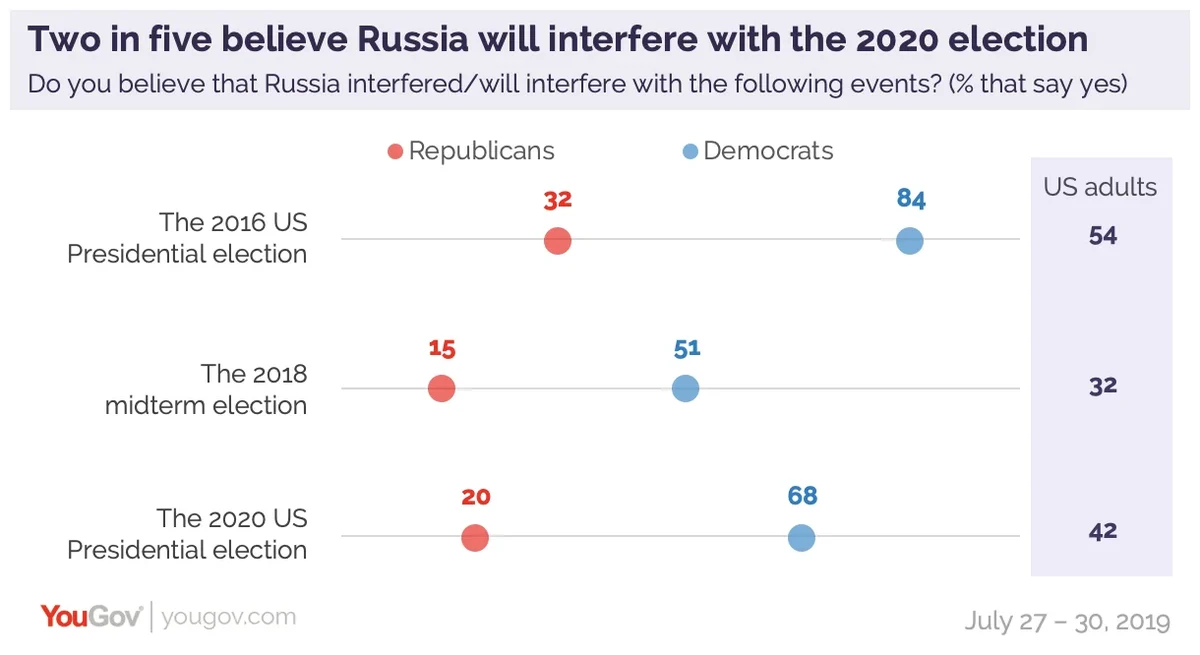Former Special Counsel Robert Mueller’s Congressional testimony last week did little to dispel party differences about his report into what the president did during and after the 2016 election. In addition, despite Mueller’s emphasis on Russian attempts to interfere in the 2016 presidential election – as well as in next year’s election – Republicans and Democrats see Russia’s activities very differently.
One in three Republicans agree with the majority of Democrats (and with Mueller) that Russia interfered in the 2016 election. Fewer Republicans -- but even more Democrats -- believe that Russia is interfering in the 2020 race. As for the 2018 midterms, as many overall think that there was no Russian interference as believe there was interference.
People say this is what they believe happened (or will happen) in American elections. What may be more concerning is that partisans draw very different conclusions about what the Mueller Report actually says. Less than half of Republicans believe the report stated that Russia interfered with the 2016 election. By two to one, Republicans believe the report exonerated the president from charges of collusion with Russia. Three in four Democrats believe the report did not. The Report says: “[T]he investigation did not establish that members of the Trump Campaign conspired or coordinated with the Russian government in its election interference activities.”
When it comes to obstruction, Republicans generally believe the report “totally exonerated” the president from charges of obstruction. Democrats overwhelmingly say it did not. The Report made no conclusion, saying: “while this report does not conclude that the President committed a crime, it also does not exonerate him,” not really a “total” exoneration.
Democrats go a step further. They overwhelmingly (69 percent to 9 percent) say that the president “tried” to collude with Russia, and by 80 percent to 8 percent, that he tried to obstruct the investigation. Only 13 percent of Republicans agree with them. Reading the report doesn’t change perceptions: those who have read at least some of the report also give responses closely related to their political preferences.
Mueller has had a tough time with Republicans, as the House Committee hearings showed. Majorities of Republicans have an unfavorable opinion of him (only 19 percent of Republicans are favorable) and disapprove of how he handled his job as Special Counsel. By 70 percent to 15 percent, Republicans believe his investigation is what the President called it, a “witch hunt.” However, if anything, Democratic opinion of Mueller rose after the hearings. Now, 71 percent of Democrats have a positive opinion of him, and 70 percent approve of how he handled his job.
Republicans today take a stronger position in support of the president than they did a year ago. More today agree with the proposition that a president should govern without too much interference from Congress and the Courts. As the president has complained about Congressional subpoena power and Court decisions that have not supported his positions, it’s no surprise that those in his party agree. By two to one, Republicans agree the president should have little interference from the other branches, and the percentage agreeing has risen 11 points in a year.
One thing that has changed for Republicans in the last year is that their party no longer controls both Houses of Congress, having lost the House in the 2018 elections. Consequently, they may see more “interference” from the Democratic-majority House.
As for electoral politics, many voters are dubious that their votes were counted accurately. While three in four Republicans who voted in 2016 say they have a great deal or quite a bit of confidence that their vote was counted accurately, less than half of Democrats agree. Black voters are particularly suspicious. Barely a third of African-Americans who voted believe their vote was counted accurately. Democrats who say today they will vote in 2020 are even less hopeful about their vote being counted accurately next year.
Despite these concerns, Democrats and Republicans agree today, as they did a year ago, that democracy is still the best form of government, even if half the country (and two-thirds of Democrats) aren’t all that happy about how it is working today.
Read the full toplines and tables results from the Economist/YouGov poll here
Photo: Getty









